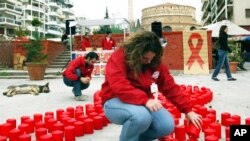European health officials say HIV infections among drug users in Greece have increased by more than 20 times in the past two years, due in part to the lack of needle exchange programs.
The European Center for Disease Prevention and Control said Friday that it recorded 314 cases in Greece during the first eight months of 2012. That compares to 208 cases for all of 2011 and no more than 15 cases a year from 2001 to 2010.
The agency said it is unclear to what extent the Greek economic crisis has contributed to the increase, but warned that austerity measures and high unemployment may lead to new infections unless prevention programs are expanded. The agency said in Friday's report that the cost of HIV prevention will be less than the cost of treating those who contract the virus that causes AIDS.
The report said Greece distributes about 45 syringes per drug user per year, far below the international standard of 200 needles per year.
The European Center for Disease Prevention and Control said Friday that it recorded 314 cases in Greece during the first eight months of 2012. That compares to 208 cases for all of 2011 and no more than 15 cases a year from 2001 to 2010.
The agency said it is unclear to what extent the Greek economic crisis has contributed to the increase, but warned that austerity measures and high unemployment may lead to new infections unless prevention programs are expanded. The agency said in Friday's report that the cost of HIV prevention will be less than the cost of treating those who contract the virus that causes AIDS.
The report said Greece distributes about 45 syringes per drug user per year, far below the international standard of 200 needles per year.





